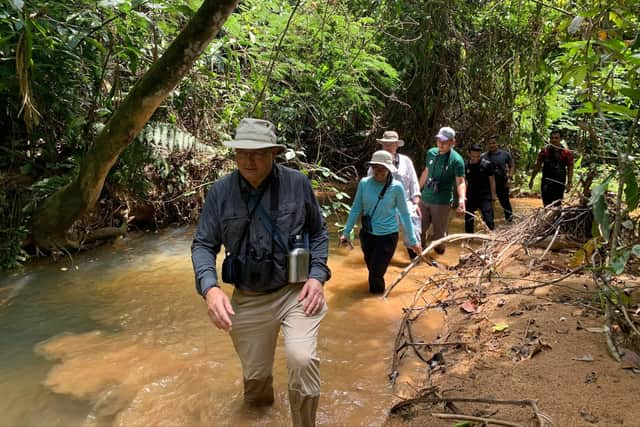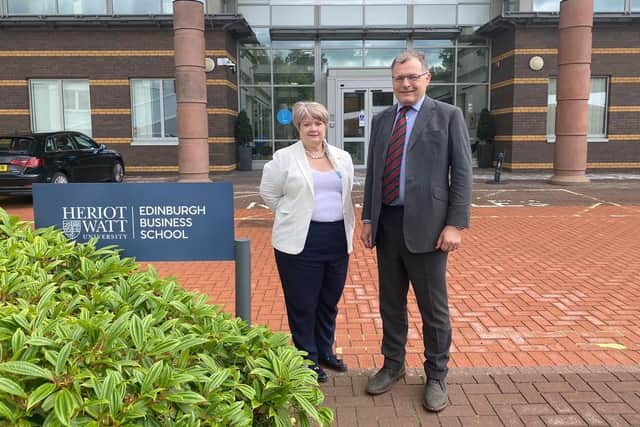The Scot leading the fight to protect wildlife in Malaysia
Aberdeen-born Charles Hay, who is the UK’s high commissioner to Malaysia, is part of a team working with officials in the country to help save threatened wildlife such as tigers and monkeys, halt destruction of forests and encourage the switch to renewable energy.
The new partnership between the two nations was signed last month and comes as scientists debate whether the discovery of a new hybrid monkey has come as a result of deforestation in the Asian country.
Advertisement
Hide AdAdvertisement
Hide AdIt comes following a commitment set out by the UK at the United Nations climate summit in Glasgow, pledging support to south-east Asian countries.
Malaysia is estimated to have lost almost two million hectares of its woodlands to logging and land clearing.
Wildlife experts believe loss of habitat could have been the key factor in the emergence of the mystery primate as animals find themselves forced to survive in smaller areas.
The mixed species creature which has triggered major discussion is thought to be the offspring of a male proboscis monkey and a female silver langur.


“The discovery of this hybrid monkey highlights why the UK and Malaysia’s commitment to working together to protect biodiversity is so important,” Mr Hay said.
“There’s much debate in the scientific community around whether the emergence of this mixed species monkey is the result of loss of habitat – but our governments are clear that we must build on COP26 in Glasgow to tackle climate and biodiversity issues.
“Malaysia has around 54 per cent forest cover and is home to some of the oldest and most biodiverse forests in the world.
“I visited a project last week which is partly aimed at saving the highly endangered Malaysian tiger.
Advertisement
Hide AdAdvertisement
Hide Ad

“The tiger needs to have large areas of joined up forest, in order to roam around to find food and a mate.
“There’s a lot of work going on in different ways to work towards preserving wildlife and the forest.”
The UK’s £110 million ASEAN Catalytic Green Finance Facility will help finance new sustainable infrastructure projects and the £274 million fund, under the UK Climate Action for a Resilient Asia (CARA) programme, will strengthen climate change adaptation across the Indo-Pacific.


Forest loss in Malaysia has been slowing since 2010 as the country attempts to strike a balance between development and meeting sustainability objectives.
The country has now committed internationally to maintain at least half of its forest cover and has set a target to reach net zero carbon emissions as early as 2050.
Scottish and UK expertise will be shared to help tackle the twin biodiversity and climate crises and improve life for residents.
“The UK and Malaysia are working on some fantastic climate change projects,” Mr Hay added.
“By sharing the UK’s technical know-how with Malaysia, we can help make maintaining and growing forested areas an important economic asset that supports the country’s GDP growth.
Advertisement
Hide AdAdvertisement
Hide Ad“A couple of months ago I visited Sabah, where we are mapping out all of the villages that don’t have a connection to the electricity grid.


“I visited one remote village where we’ve helped install a micro hydro machine which runs off the local river and provides enough power for 52 homes.
“The UK has expertise we can pass on to help local people do more to help themselves.
“That is the sort of cheap, effective project we’re hoping to support more of.
“Last month, I was up in a northern state called Terengganu and we’ve got a nice project there where we are helping them to map out what carbon is being stored by the forests in one of the nature reserves.
“This is really important to establish a kind of baseline for future carbon trading.”
The 56-year-old Scot, a father of two teenagers, is based in the Malaysian capital Kuala Lumpur.
He highlighted the links between his homeland and his Asian base.
Advertisement
Hide AdAdvertisement
Hide Ad“One of the great things about being in this country is the incredible connections between Malaysia and Scotland.
“For example, Heriot Watt University has a campus in Putrajaya and I’ve been keen to visit them in Edinburgh to explore how we can help strengthen the links even further.
“At the UK Embassy you can see the insignia of the 5th Royal Malay Regiment, who are twinned with the King’s Own Scottish Borderers, and they still wear tartan and play the pipes.”
With a military background, following in his great-grandfather’s footsteps to join Scotland’s Gordon Highlanders regiment in 1988, he has faced conflict up close.
“I served in Northern Ireland while the security situation was still pretty lively,” he said.
“I remember regularly having bricks and bottles thrown at us while we were out on patrol.
“One time on foot patrol, we were fired upon.
“I’ve never been as worried or nervous but as platoon commander you can’t show you are scared.
He also previously served as ambassador to South Korea when tensions with North Korea had escalated as US President Donald Trump goaded Kim Jong Un on social media.
Advertisement
Hide AdAdvertisement
Hide Ad“The most nervous point was when the Americans had three air strike carriers in the seas around Korea and set off a giant bomb in Afghanistan, which people had interpreted as a warning to Kim Jong Un that they meant business,” he said.
“It was a challenging time.”
But despite these experiences he now believes the environmental crisis is the most dangerous ever known.
He said: “Climate change is now the biggest threat to my kids’ future so I’m proud the UK is leading on working with other countries to make a difference.”
Comments
Want to join the conversation? Please or to comment on this article.
